
Experiencing senior depression and aging
Senior depression and the forgotten
When I was in high school, I volunteered as a Candy Striper at the local hospital. And if you’ve never heard of a Candy Striper, they are hospital volunteers who work directly under the nurses. We helped restock any of the carts with linens and other supplies. Often, we helped with the meal distribution or took patients to their appointments on another floor. We made sure patients had everything they needed, including blankets, water and ice chips. And we sat and talked with patients to give them comfort and company.
Over the years, I spent some time in each part of the hospital, including extended care, as well as the separate care home in town. I was just a teenager then and age and mortality did not really factor into my world too much. But what struck me even back then was the number of elderly patients I worked with who received medical care and were alone.
Sure, most patients had family come visit once a week or once a month. And you could usually tell that the grand-kids were very uncomfortable. But on a daily basis, they lived with other elderly patients and the facility’s care staff. As they became less mobile, they stayed mostly inside the care home, basically just waiting to die. The harsh reality of that scared me to the core and I often thought about that as I moved away and went to university.
Is senior depression inevitable?
Now that my grandma needs living assistance and my own parents are aging, I often think back to my time at the hospital. And I wonder if there isn’t a better way. Under the circumstances, it is not surprising that senior depression is very common. But there is also the example of my great-aunt, which fills me with some hope.
She lived in an assisted care facility in Florida until her death and she had the time of her life.
Whenever the care facility held events, she went on regular outings and took part in fun nights. She enjoyed her life to the fullest and made every moment as fun as she could. The reality is that quality care homes can be extremely expensive and most people with a regular pension simply cannot afford them. And having a family member who needs medical care and daily assistance live with you can be more than a working family with kids can manage.
“We don’t stop playing because we grow old. We grow old because we stop playing.”
- George Bernard Shaw
With age, many complex factors come together to create a very hard situation to navigate for many families. Yet why is depression in older adults sometimes treated as an inevitability? Depression is certainly not a normal part of aging, although many parts of our society seem to treat it that way. So what does science say can be done to change the situation to a more positive experience?

What causes senior depression?
Depression in older adults, or in the elderly is such a common situation these days, that society almost views it like an inevitability. Socially, we definitely value youth over old age. This value system shows strongly in how we treat older adults in our society. Many factors come together to create this higher likelihood of depression for older adults. Let’s have a look at some of the main factors that contribute to it.
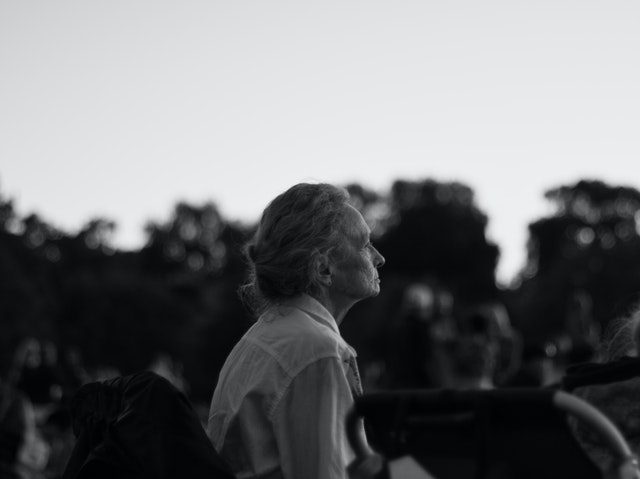
Health
Possibly the main factor that adds to depression in older adults is their health and mobility. As we age, it is inevitable that we will see and feel the wear of aging on our bodies. It becomes harder to lose excess weight or build muscle. Joints can become stiff and even painful and wounds or injuries don’t heal as quickly.
Many older adults are suffering from chronic conditions or illnesses that only seem to get worse with age. What might have been a nagging ache can develop into debilitating pain over the years. Another factor could be a loss of hearing or sight that makes certain activities a lot harder, if not impossible.
As the conditions add up, and the energy levels come down, more older adults back away from exercise and activity altogether in order to avoid the risks and pains associated with it. Mobility can become more difficult. And that starts to quickly restrict the freedom of being able to go where you want, when you want. Ironically, a continued level of physical activity is sometimes the only thing that can hold chronic conditions at bay.
Isolation
Not many of us live with our grandparents in the same house anymore. Partly this is due to the way our family units have evolved over the last decades. Seniors are more commonly living in senior communities or care homes rather than in the homes of their children. Although some seniors’ facilities are getting more luxurious, most older adults cannot afford to live in these types of communities.
Many older adults face financial hardship after retirement and are forced to live in conditions that are not supportive, inspiring, or healthy. Isolation can be a really hard thing to deal with, especially if the family is not able to visit a lot. This isolation can be even worse if a partner or good friend has passed away.
Mourning can sometimes transition into depression as the grief builds up. The current health crisis has also made it harder to stay connected and engaged with the seniors in our lives. Because of the risk of infection, many care homes have not allowed in-person visits for a long time. This can be devastating for an elderly person already feeling isolated or alone.
Technology
As technology continues to develop at break-neck speeds and take over more and more facets of our lives, there is definitely one generation more likely to be left behind. Technology like smartphones, wearables, and laptops is so intertwined with our daily lives today. And we often forget it didn't even exist when the older generation grew up. It's understandable that they don’t have the same positive approach to it as the younger generations may have. It's simply a question of just not being used to it.
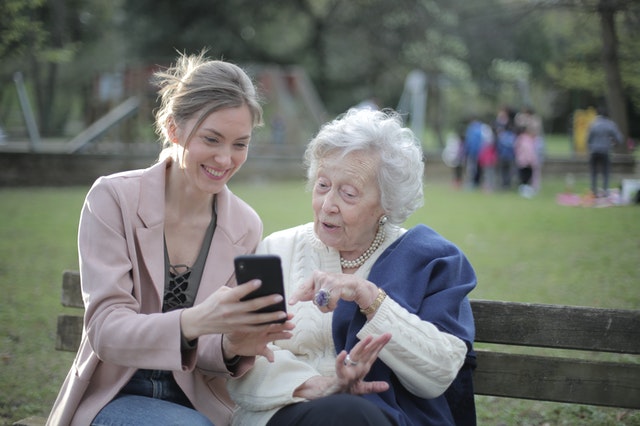
Many seniors struggle with the interfaces that seem intuitive to younger folks. And many more don’t find the technology necessary or worthwhile to learn. Some seniors have refused to adapt to any of the newer technologies. As a result, they have fallen behind too far to jump into certain apps or programs that may govern their grandchildrens’ lives.
Increasingly, we are also looking to technology to keep us comfortable and safe. Technology is often the first idea someone may offer their older parent to solve a problem. Simply put, the technology gap can have a detrimental effect on communication and relatability between generations. This is unfortunate because it means that it is even harder to share experiences and feelings we may have in common.

What can be done to improve senior depression?
As a large part of our population transitions into old age, more and more research has been done on the adult brain and how aging affects it. As we begin to understand senior depression better, we are also starting to find some clues as to what may help keep it at bay. Let’s have a look at some of the recommendations.

Keep a purpose
Many older adults feel the pressure to make way for the younger generation in their job. While many are looking forward to retirement, some really love being at the top of their game and sharing their wisdom at their job. While retirement may be inevitable, it shouldn’t be rushed if the work is enjoyable and stimulating.
Research shows that having a purpose and contributing to society are vital factors in fighting off senior depression. After retirement it becomes even more important to find new ways to participate in and contribute to the community. Volunteering can be a great way to continue to live for a purpose and it can be great in expanding your social circle too.
Learn a new skill instead of doing Sudoku
Sudoku and other brain puzzles have been sold in a multi-million dollar industry to “keep your brain young”. Unfortunately, some research shows that brain puzzles are not all they’re hyped up to be. Learning a new skill (be it crosswords or Sudoku) can definitely help keep your memory trained. But, continuing to do crosswords all day won’t specifically help you fight off Alzheimer’s or senior depression.
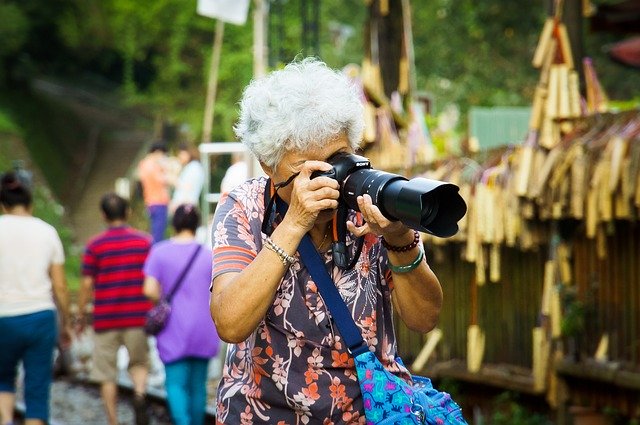
The key in the equation is learning new skills, whether that be embroidery or welding. It’s the continuing challenge of learning something new that has a positive effect against depression and disease. This happens because neuroplasticity is still a factor even when you are older. Plainly said, learning new skills forces your brain to make new brain connections, which in turn helps your mind stay “younger”.
So maybe that’s how my great-aunt managed to stay happy in old age? She did learn to water-ski in her nineties!
Fight complacency
Similarly to learning new skills, fighting all aspects of complacency in life could be a vital key to fighting senior depression. It seems that approaching something that scares you could be of particular value to the brain and to your mental health. This means challenging old, worn-in pathways that you’ve always had.
Maybe you’ve always been scared of water. So a brave and worthwhile thing to do in your old age is to challenge that notion and take swimming lessons in order to build confidence in the water. Becoming complacent with all of our routines and fears starts to restrict our daily lives more and more.
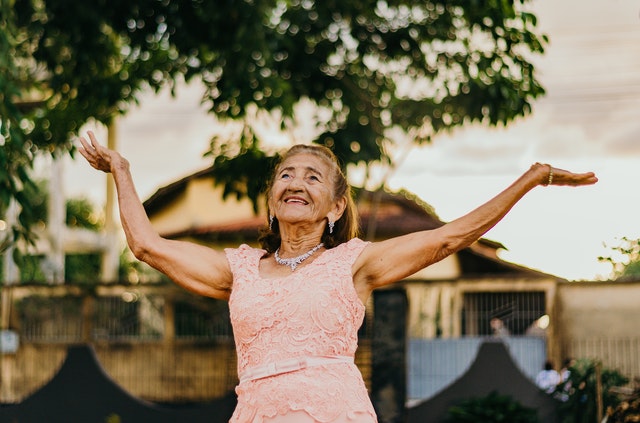
So, challenging these complacencies is a great way to break free of restrictions. Maybe address your fear of heights by getting your pilot’s license. Or take that trip to the Grand Canyon you always wanted to take. It’s all about continuing to grow and learn. Being conscious of how to do this safely as you age is, of course, an important part of that.
Walk in the park, not at the gym
While exercise in general is one of the most important ways to keep your body active, according to your brain, not all exercise is the same. Walking has often been recommended to keep the body moving and improve mood. But research shows that walking around outside can be more beneficial than walking on a treadmill.
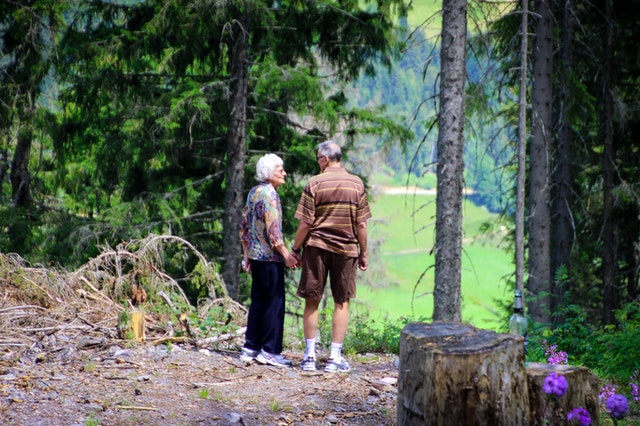
Apparently we get the most mental benefit from walking in nature because our brains have to engage the hippocampus in order to do it. This part of the brain is responsible for our spatial awareness and navigational memory, so it helps us find our way around.
When we are walking in new, wild trails, this part of the brain is active. On the other hand, a walk on the treadmill doesn’t require its input much. Either way, you will get the benefit of exercise. But walking and navigating outside will give you some added mental training which can have a positive effect on your mental health.

The Takeaway
While there are lots of factors that lead to senior depression, there are also many things that can be done to keep seniors active, engaged and happy. It seems that the brain holds many of the keys to this vitality in older age. The more we learn about brain health and mental health, the more we are able to take preventative steps to keep healthy and happy well into older age.

Sitting in a care facility alone and depressed does not have to be the inevitable final result. Keeping active, not only physically, but mentally can go a long way in holding off senior depression. I have also seen many elderly people start living communities together. This means they get to live in the comfort of their home, while sharing their lives with other elderly adults. This prevents loneliness and encourages community and learning new skills.
I truly believe that as we age, we need to re-think what aging means and how we facilitate living and thriving in older age.
We also need to rethink how seniors contribute to society and ensure that everyone is able to follow their purpose. This will also help with reducing senior depression and build community between different generations. Especially after giving so much to raise the next generation and working all their lives, seniors are an integral part of our communities. And to keep senior depression at bay, we need to work together to support our older members of society.
Let’s make sure we honor the lives of our elderly by making aging something to be proud of, not something to be scared of!
Sources
https://www.healthline.com/health/depression/elderly#causes
https://www.webmd.com/depression/guide/depression-elderly#1
https://www.nia.nih.gov/health/depression-and-older-adults
